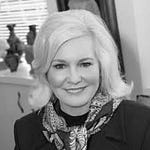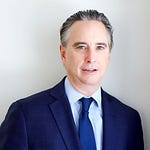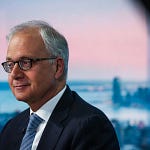Dear Friends,
In a recent interview with the Financial Times, Henry Kissinger said that we are now living in a totally new era. The G20 meeting in Bali this week reflected that reality. Putin did not attend, but Xi Jinping and Joe Biden had a long meeting that seemed to offer some hope for lessening tensions between the world’s two largest economies.
Half a century ago, Nixon and Kissinger crafted a new relationship with China meant to sideline Russia, and here we are. Russia has never been more isolated. The G19 nations signed off on a statement condemning Russian military actions in Ukraine.
During the meeting I had a chance to speak with John Kirton, director of the G20 Research Group in Toronto. He agrees that the era of China’s “friendship without limits” with Russia has ended. Amongst the other participants, a constructive mood prevailed in Bali. The related themes of climate change and the architecture of global health dominated the meeting, and a $10B pandemic defense fund was launched. For more details about Bali, you can read his group’s full report here.
Closer to home here in Chicago, DePaul finance professor Karim Pakravan writes below about his views on the G20 meeting and global climate change. In this podcast, Professor Pakravan and I focused on emerging markets, the subject of a series of articles he wrote for EconVue over the past few months. I especially value his perspective because before he became an academic, Pakravan spent 22 years in the private sector focused on country risk management.
Just as Kissinger feels we are as wrong to lump Russia and China together, Pakravan explains that there are actually two separate and distinct groups of developing economies- perhaps we need to rename them. The first is self-sufficent in terms of food and fuel and will weather the coming economic storm. But the second group, that depends on the outside world for basic resources and has record levels of dollar-denominated debt, could experience an economic crisis as well as a humanitarian catastrophe. All in all, Pakravan’s views align with a growing concensus that 2023 will be a very tough year for the global economy.
Next year’s G20 meeting will be held in India. It would be nice to think that the war in Ukraine will be over by then, and that the US and China will be on more than speaking terms. A steady drop in inflation could mean that US monetary policy will not trigger a tsunami of global debt defaults in the world’s most vulnerable countries. Although the topics are quite serious, I hope you will enjoy and learn as much from my conversation with Karim Pakravan as I did.
Our next podcast is with Shannon O’Neil of the Council on Foreign Relations. Her new book The Globalization Myth: Why Regions Matter is highly recommended for your Thanksgiving reading. What I learned from both Shannon and Karim is that the way we should be looking at the world economy is rapidly changing. A new framework is emerging, and understanding is vital to better investment decisions and policy choices.
With all best wishes,
Lyric Hughes Hale
Editor-in-Chief
Karim Pakravan on EconVue
November 14, 2022
Bali and Cairo: A Challenging Set of Global issue
s Meets the Climate Emergency
The latest G20 Summit is currently being held in Bali, Indonesia. While the organization has often fallen short of its declared goal, it is still providing a useful high-level platform for highlighting major issues facing the global economy. The UN Climate Conference, COP27, is coincidentally meeting in Cairo.November 03, 2022
Global Manufacturing: The Canary in the Coal Mine
The PMI Manufacturing surveys, with a few exceptions, indicate a deteriorating manufacturing environment both at the global and national levels. October 12, 2022
The IMF View: Broad Slowdown-or Does Everyone Hate the Fed?
The global economic horizon has darkened considerably in the past few weeks. Published at the outset of the annual IMF/World Bank October 2022 meetings, the IMF reports that it expects global economic growth to slow down from 6% in 2021 to 3.1% this year, and 2.7% next year. Of the three largest economies, the United States and the European Union may be heading to recession, while China’s economy is close to being flat. This bleak economic picture is occurring as policymaking in major countries is in disarray.September 14, 2022
Emerging Markets on the Cusp: Part Three - Emerging Markets Debt Crisis or Resolutions??
This article is the third of a series about the challenging global environment facing Emerging Markets/Developing Countries (EM/DCs) living with the legacy of the pandemic and the Ukraine war. In this series, we want to apply the techniques of Country Risk Analysis to assess the changing risk environment, especially as it applies to a potential debt crisis. August 30, 2022
Emerging Markets on the Cusp: Part Two- Emerging Markets and Global Risks
This article is the second of a series about the challenging global environment facing Emerging Markets/Developing Countries (EM/DCs) living with the legacy of the pandemic and the Ukraine war. In this series, we want to apply the techniques of Country Risk Analysis to assess the changing risk environment, especially as it applies to a potential debt crisis. August 08, 2022
Emerging Markets at the Cusp: Part One-The Past as Prologue
This article is the first of a series about the challenging global environment facing Emerging Markets/Developing Countries (EM/DCs) living with the legacy of the pandemic and the Ukraine war. In this series, we want to apply the techniques of Country Risk Analysis to assess the changing risk environment, especially as it applies to a potential debt crisis. Emerging Markets
November 14, 2022/World Bank Blogs
The Globalization of Financial Risk: How ETFs Make Local Markets Less Local
Tomas Williams, Nathan Converse & Eduardo Levy Yeyati
In this new paper we find evidence that investor flows to ETFs are more responsive to global risk factors and less responsive to local factors such as the fiscal and growth performance, relative to investor flows to traditional mutual funds. Consequently, the larger the share of a country's market capitalization held by ETFs, the greater is the sensitivity.November 9, 2022/Pensions & Investments
Nordic, U.K. Pension Funds Join Call for Climate Finance in Emerging Markets
Hazel Bradford
Nordic and U.K. pension funds joined other members of the Climate Investment Coalition on Wednesday calling for more climate finance in emerging marketsNovember 7, 2022/Financial Times
COP27: US works on plan for companies to fund emerging nations’ fossil fuel switch
Camilla Hodgson & Aime Williams
The US is working on a plan to harness cash from the world’s largest companies to help developing countries cut their use of fossil fuels, an idea it aims to unveil at the UN climate summit this week.















Share this post